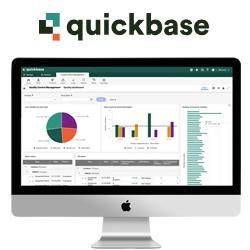In the ever-evolving landscape of technology and sustainability, the concept of the "twin transition" has emerged, highlighting the simultaneous journey towards digitalization and sustainability.
 Navigating the twin transition: The crucial role of ISVs in digitalization and sustainability
Navigating the twin transition: The crucial role of ISVs in digitalization and sustainability

Stefan Reuther | COPA-DATA
In the ever-evolving landscape of technology and sustainability, the concept of the "twin transition" has emerged, highlighting the simultaneous journey towards digitalization and sustainability. As we prepare for the Annual Meeting 2024, it becomes increasingly evident that Independent Software Vendors (ISVs) are pivotal for navigating these changes. Here, Stefan Reuther, Member of the Executive Board at COPA-DATA, will shed light on innovation, trust and the role of ISVs for corporate sustainability.
The concept of the twin transition encompasses far more than two simultaneous trends. It also signifies the integration of two areas that sit prominently at the top of the political agenda. The fusion of these areas has the potential to change the world. However, to succeed, a better understanding of the technologies that facilitate them is essential.
The evolving role of ISVs in a digitalized world
The European Commission’s (EC) report, Towards a Green & Digital Future argues that digitalization cannot be achieved in technological siloes. “Technologies are not independent of one another. There are several connections and interdependencies between them. In fact, the combination of different digital technologies could in itself be an impactful innovation,” the report states.
Data and data analysis are the backbone of the green transition. Independent Software Vendors (ISVs) have therefore become this mission’s indispensable protagonists, due to their agility and adaptability compared to proprietary technology. ISVs boast an ability to break down communication barriers between different equipment and systems, making the data capture necessary for environmental action more straightforward.
This is particularly true of large global businesses. Given that many industrial companies grow through acquisitions, a common hurdle for data capture is the communication barriers of legacy systems and infrastructure. Consider AB InBev as an example. The multinational brewing company leads the way for digitalization in breweries and highlighted the advantages of working with ISVs in a recent interview with COPA-DATA.
“Legacy systems may require upgrades or replacements to enable a smooth digital transformation, which can be expensive,” explained Charles Tisdell, Global Director Connected Brewery IIoT & Automation at AB InBev. “This is where partnering with a company like COPA-DATA can help you build the IIoT and data layer while maintaining or migrating away from legacy infrastructure. It enables the use of other niche systems to deliver targeted solutions.”
Balancing innovation and trust
The advantages of independent technology for the digital and green transitions are clear. That being said, the role of ISVs extends beyond providing technological solutions. Many ISVs are small or medium-sized enterprises (SMEs), giving them a competitive edge over larger alternatives. In a WEF briefing paper, Data Unleashed: Empowering SMEs for Innovation and Success, these businesses are described as the foundation of the global economy, representing 90 per cent of all businesses and nearly 70 per cent of all global jobs and GDP.
These organizations are also drivers of innovation. Without the shackles associated with large or listed businesses — pressure from investors, slow research and development and complex organizational structures — small to medium-sized ISVs have a high potential for growth and change. They can contribute fresh ideas and nimble approaches to digitalization; and therefore, to sustainability goals too.
Of course, sustainability is not a compulsory exercise. However, with high energy prices and the climate crisis, ISVs offer a timelier method of embarking on a sustainability journey. What’s more, independent vendors provide opportunities to start small on these journeys and scale over time.
AB InBev recommended this model of scaled digitalization based on their longstanding relationship with COPA-DATA. “Start small and focus on quick wins,” explained Tisdell. “Identify pilot projects or use cases that demonstrate the value and feasibility of digital technologies within your organization. Learn from these initial experiences, iterate, and scale up gradually.”
Choosing a project to improve a business’s environmental impact — for instance, reducing carbon emissions, water usage or waste — is an ideal first step in using technology for the green transition. And all of this can only be started by collecting the right data and its contexts.
Open automation
Transparency is as key to the success of ISVs as their agility. At COPA-DATA, we believe in open automation. Users of our automation software platform, zenon, are able to select whatever system, equipment or software they choose, and we have developed a system to ensure their ideal set-up communicates seamlessly. This is a stark contrast to the limitations and restrictions of proprietary software.
Not only do we take our no-code-approach to provide customers with freedom of choice, but also to facilitate their digitalization and sustainability goals. Moving away from silos and vendor lock-in, and towards open data sharing is the only way we can empower businesses to understand their data and take action to improve their environmental impact.
Future challenges of sustainable digitalization
The twin transition is not simply concurrent digitalization and sustainability efforts; it's also a delicate balancing act. Digitalization can either support or impede the journey towards net-zero goals. According to the aforementioned EC report, the IT industry’s contribution to greenhouse gas emissions was estimated to be between 3 and 3.6 per cent of total global emissions in 2020. That’s not to mention the colossal energy consumption of global data centres, consuming around one per cent of the world’s electricity already in 2018 – rising sharply.
As developers of digitalization platforms, we see it as the role of ISVs to initiate projects that provide added sustainability value. We cannot solely focus on the sustainability goals of our customers — many of which focus on firsthand economic outcomes — but we must also consider the environmental impact on wider society and the planet.
ISVs play a crucial role in shaping the intersection of digitalization and sustainability. As the twin transition converges these two areas of business transformation, it is crucial that organizations consider the potential of ISVs to provide innovation, adaptability and transparency during this significant business change.
To learn more about COPA-DATA’s automation software platform, visit the website.
About COPA-DATA
COPA-DATA is an independent software manufacturer that specializes in digitalization for the manufacturing industry and energy sector. Its zenon® software platform enables users worldwide to automate, manage, monitor, integrate and optimize machines, equipment, buildings and power grids. COPA-DATA combines decades of experience in automation with the potential of digital transformation. In this way, the company supports its customers to achieve their objectives more easily, faster and more efficiently. The family-owned business was founded by Thomas Punzenberger in 1987 in Salzburg, Austria. In 2022, with more than 350 employees worldwide, it generated revenue of EUR 69 million.
The content & opinions in this article are the author’s and do not necessarily represent the views of AltEnergyMag
Comments (0)
This post does not have any comments. Be the first to leave a comment below.
Featured Product

